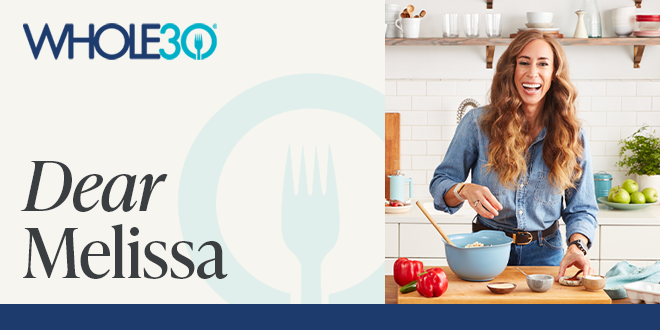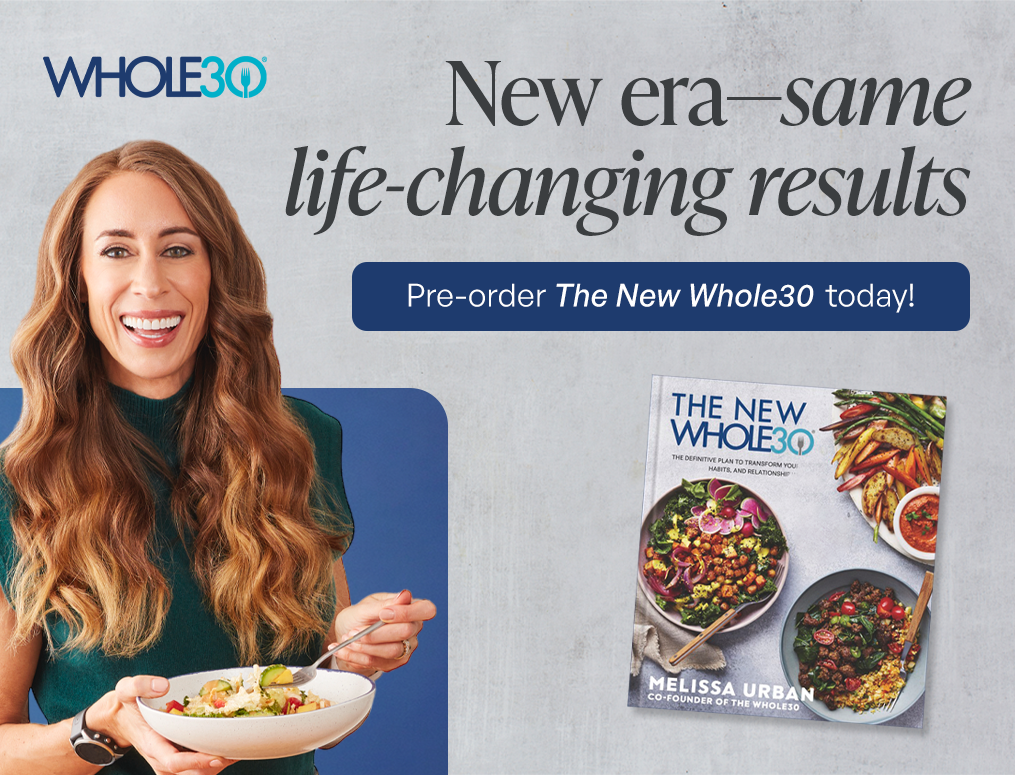Note: The Whole30 is not recommended for those with a history of disordered eating, diagnosed or otherwise. If this is your context, the Whole30 should only be completed under the direct supervision and guidance of an experienced therapist or qualified healthcare provider. Always check with your healthcare provider before beginning any new diet or lifestyle program.
Dear Melissa,
I’m coming to the Whole30 in part because I want to lose weight. I know the Whole30 isn’t a weight loss diet, and I’m not planning to approach it like one. I won’t be tracking or cutting calories, stepping on the scale, or denying myself food when I’m hungry. I have other reasons for starting the program, too; I’m hoping the Whole30 can help me improve my cravings, energy, sleep, and digestion—and an improvement in joint pain and self-confidence would be welcomed. Still, I have to ask… will I lose weight on the program? —Holding Space for Both
Dear Holding Space,
Weight loss (especially intentional weight loss) is a tricky topic for us—and for society in general, given everything we now know about diet culture, weight bias, and misconceptions around size and health. To answer your question—maybe, it depends. Which is often the best answer, but never the most satisfactory.
Before I delve into the how and why, it’s important that I share the evolution of Whole30’s perspective on weight loss, and where we stand on this topic today. Note, this article was reviewed and edited by licensed psychotherapist Eliza Kingsford, with whom I worked closely when writing about weight loss in my new book, The New Whole30.
Historical swings
In the earliest days of Whole30 (2010-2011), we published and promoted Whole30ers weight loss testimonials and before-and-after photos. While we never encouraged or offered advice for weight loss on the Whole30, it can be a natural byproduct of the program, and we wanted to tell your Whole30 success stories in your own words. That’s why you’ll see weight loss statistics quoted in my first book, It Starts With Food, and why early social media posts and testimonials featured your Non-Scale Victories (NSVs) and your weight loss.
At the time, mainstream media outlets often miscategorized the Whole30 as yet another quick-fix weight loss diet. That, combined with our own testimonials, created confusion. Many people felt that us saying “Whole30 isn’t a weight loss diet” while featuring articles and photos clearly highlighting weight loss sent mixed messages. That was fair criticism, and we took that feedback to heart.
As the years went on, we made more of an effort to message the Whole30 as an elimination and reintroduction program, to separate ourselves from quick-fix weight loss diets. As part of that effort, we also changed the way we handled testimonials, success stories, and features on our website. Though we honored your desire to change your body, we stopped posting weight-focused before-and-after photos, and removed any references to weight loss from our published testimonials. In fact, if you shared your weight loss in a comment on social media, we’d ignore it entirely and reply, “But how do you feel?”
In truth, we swung too far in the other direction, purposefully minimizing and disregarding your weight loss goals and weight-related Whole30 results. Our intentions were good. We had become far more aware of the toxic nature of diet culture, and wanted to offer a dietary regimen and community space free from that language and those visual cues. The impact we had with this approach, however, meant that you were still getting mixed messages from us.
We’d say, “We honor your weight loss goals and respect your right to do with your body as you choose.” Yet when you’d share your Whole30 results, including the sense of pride and accomplishment you felt in your body, we’d ignore and omit that part of your story. For many I’ve spoken with since, this left you feeling as if your desire to lose weight or change your body was wrong or shameful.
I told you this was tricky. And I’m sorry—truly—that we didn’t always get it right.
Whole30 and weight loss today
I spent months reflecting on Whole30’s evolution and relationship to weight loss in preparation to write this section in The New Whole30. I also consulted several experts in the field of weight loss, anti-dieting, and disordered eating. My discussions with them shaped what I’ll share with you here today. At a high level, here is our current position on the Whole30 and weight loss:
- What you choose to do with your body and weight is your business. We support, respect, and honor your right to do what is right for your body.
- We believe the desire to change your weight or body in any fashion is morally neutral. You should not be shamed, pressured, or judged for these desires.
- Whole30 is not a weight loss diet. We do not offer weight loss advice or guidance for the program. You will eat to satiety without restricting calories, portions, meals, or meal timing on the program. You will not weigh yourself or take measurements during the 30-day elimination phase.
- While we do not solicit or track weight loss results from participants, weight loss and/or body composition changes may be a natural byproduct of your Whole30 elimination and reintroduction, via a variety of mechanisms.
- We will work with you to share your Whole30 success story, including commentary around weight or weight loss, in a way that respects your self-described journey and remains on-brand for us.
I should also make it clear that not all weight loss dieting is the same. Yes, quick-fix, unsustainable weight loss dieting (rooted in diet culture) is damaging, both physically and psychologically. The mindset and belief system that we’re indoctrinated into when we radically cut calories, equate health with thinness, and rely on the scale for our worth and value has given many of us an unhealthy relationship with food and our bodies.
However, healthy, sustainable weight loss approaches do exist. Those approaches have significant overlap with the principles of the Whole30, in that they:
- Set realistic weight loss goals, focusing on consistency and maintainability
- Are personalized for your body, lifestyle, and capacity
- Focus on nutrient-density and satiety
- Don’t moralize food or your body
To return to your original question, will you lose weight on the Whole30? You might not, because the program isn’t designed specifically for that purpose. (It has so many other benefits!) Or you might, without ever focusing specifically on weight loss. But even if weight loss is a goal of yours, I still don’t want you to use the Whole30 as a weight loss diet.
Experience the power of the Whole30 NSVs
The goal of the Whole30 is not weight loss. Our program offers you the unique and life-changing opportunity to discover the personalized diet that works best for your body. During your 30-day elimination, pay attention to how the absence of these foods is impacting your energy, sleep, cravings, mood, digestion, focus, aches and pains, and other symptoms. Improvements in these areas (and more) are called Non-Scale Victories, and can be tracked throughout your program using our NSV Checklist. Many people have found the elimination phase alone is the catalyst for a dramatic health transformation.
The Whole30 rules, recommendations, and support are also grounded in habit research and behavioral change. During elimination, you will also be giving yourself an intentional break from the foods (and drinks) you’ve been automatically reaching for to deal with stress, provide comfort, or numb your feelings. This helps you better understand the emotional or habitual role these foods play in your life, and creates the opportunity to practice other strategies for effectively dealing with stress and discomfort.
Following elimination, you’ll then move into your reintroduction period. In this 10-15 day phase, you’ll reintroduce the foods you’ve eliminated, one food group at a time, and pay attention to the same factors. How does the reintroduction of these foods affect how you feel and live? Do bringing back any of these foods diminish the positive changes you’ve experienced, or bring back symptoms you’ve happily shed during elimination? What do you notice about your emotional experience as you bring certain foods or alcohol back, and are there patterns or themes that emerge? Compare your experience, using a journal, Notes app, or Whole30 Day by Day to track your reintroduction results.
By using our detailed blueprint for elimination and reintroduction, you’ll be able to identify the foods that work best in your system—and which don’t work well for you in your current context. These learnings can then be built into your own joyful, sustainable Food Freedom plan, allowing you to enjoy a broad range of delicious, culturally-significant foods while continuing to feel as good as you want to feel.
For those of you who came to the Whole30 hoping to lose weight, I’m not ignoring that. I am, however, asking you to give yourself a short and well-deserved break from thinking about it while you’re on the Whole30. Tell yourself, “I’m taking a month off from focusing on my body weight. I’m going to spend this time exploring how the foods I’ve been eating are impacting my mental and physical health. I’ll be creating new healthy habits that will serve me for the rest of my life. I’ll examine my emotional relationship with food without shame or judgment, and discover new ways to relieve anxiety, self soothe, and manage stress. And I’m going to purposefully seek victories that have nothing to do with the scale.”
You may find the idea of this break a huge relief—or it may make you nervous or uncomfortable. I recognize and hold space for any of these reactions. But I truly believe you deserve the life-changing experience the Whole30 has brought to millions of people just like you. And I also know the Whole30 can set you up for success for the rest of your life—whatever your goals may be.
Your weight loss journey
After the Whole30, you may choose to shift your diet into a healthful, sustainable weight loss approach. In which case, you’ll find your Whole30 experience invaluable in those efforts.
- You’ll be able to avoid the foods that you’ve discovered lead to negative health consequences for you, minimizing inflammation, bloating, and other symptoms.
- You’ll feel connected to your body, trusting the signals it sends you.
- You’ll be confident in your food choices, and in saying “no” to what doesn’t serve you.
- Your tastes will have changed, and you’ll enjoy the natural flavors found in whole, nutrient-dense foods.
- Your cravings will be diminished, making it easier to stick to whatever dietary program you choose in the months following.
- You’ll have a variety of new coping skills to navigate stress, discomfort, and negative emotions that don’t involve automatically reaching for food or drink.
Your Whole30 learnings and skills can keep you feeling your best and your most confident as you continue to pursue your own unique health and body composition goals. So please, give us 30 days. Take a short break from thinking about your body weight or pursuing intentional weight loss. Let us help you focus on all of the other magical things that can change when you change the food on your plate. Let our community support you, hold you accountable, lift you up, and cheer you on. You have nothing to lose, and everything to gain. I wish you nothing but life-changing success on your Whole30.
Best in health,
Melissa
Disclaimer: This page contains affiliate links. We earn a small commission when you purchase through these links.


















